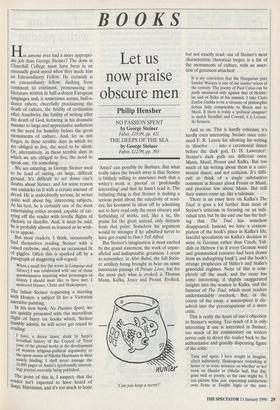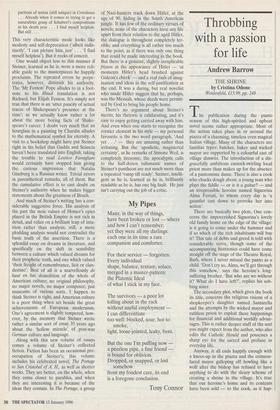BOOKS
Let us now praise obscure men
Philip Hensher
NO PASSION SPENT by George Steiner Faber, £19.99, pp. 421 THE DEEPS OF THE SEA by George Steiner Faber, £12.99, pp. 393 Has anyone ever had a more appropri- ate job than George Steiner? The dons at Churchill College must have been in an unusually good mood when they made him an Extraordinary Fellow. He certainly is an extraordinary fellow; dashing from continent to continent, pronouncing on literature written in half-a-dozen European languages and, it sometimes seems, half-a- dozen others; cheerfully proclaiming the death of culture, the futility of civilisation after Auschwitz, the futility of writing after the death of God, lecturing in his dramatic manner to large and appreciative audiences on the need for humility before the great monuments of culture. And, let us not forget, in these terrible days in which we are obliged to live, the need to be silent. Or, alternatively, in these terrible days in which we are obliged to live, the need to speak out. Or something.
We are entering, as George Steiner used to be fond of saying, on large, difficult ground. It's difficult to set down one's doubts about Steiner, and for some reason one embarks on it with a certain amount of dread. He is undoubtedly serious, he writes quite well about big, interesting subjects. At his best, he is certainly one of the most entertaining critics around, capable of car- rying off the reader with terrific flights of rhetoric or diatribe. And, it must be said, he is probably almost as learned as he wish- es to appear.
But most readers, I think, occasionally find themselves reading Steiner with a raised eyebrow, and, even an occasional fit of giggles. Often this is sparked off by a paragraph of staggering self-regard:
When a small boy [he wrote in Language and Silence] I was confronted with one of those questionnaires inquiring what personages of history I should most like to have met, I answered Homer, Christ and Shakespeare.
The infant Steiner requesting a meeting with Homer; a subject fit for a Victorian narrative painting. In his new book, No Passion Spent, we are quickly presented with this marvellous flight of fancy on books which, Steiner humbly admits, he will never get round to reading: I have, a dozen times, slunk by Sarpi's leviathan history of the Council of Trent (one of the pivotal works in the development of western religious-political argument); or the opera omnia of Nikolai Hartmann in their stately binding; I shall never manage the 16,000 pages of Amiel's (profoundly interest- ing) journal currently being published.
The point of this is, I suspect, that the reader isn't expected to have heard of Sarpi, Hartmann, and it's too much to hope `Amiel' can possibly be Barbara. But what really takes the breath away is that Steiner is blithely willing to announce both that a writer's work is 'pivotal' or 'profoundly interesting' and that he hasn't read it. The irritating thing is that Steiner is making a serious point about the selectivity of read- ers; his keenness to show off by admitting not to have read only the most obscure and forbidding of works, and, like a tic, the praise for the great unread, only detracts from that point. Somehow his argument would be stronger if he admitted never to have got round to Don't Tell Alfred.
But Steiner's imagination is most excited by the grand statement, the work of unpar- alleled and indisputable greatness. I seem to remember, in After Babel, the full Stein- er artillery being brought to bear on some innocuous passage of Private Lives, but for the most part what is evoked is Thomas Mann, Kafka, Joyce and Proust. Evoked, `Can you keep a secret?' but not exactly read; one of Steiner's most characteristic rhetorical tropes is a list of the monuments of culture, with an asser- tion of greatness attached: It is my conviction that the Hungarian poet Sandor Weores is one of the master voices of the century. The poetry of Paul Celan can be justly measured only against that of Holder- lin and of Mice at his summit. I take Carlo Emilio Gadda to be a virtuoso of philosophic fiction fully comparable to Broch and to Musil. If there is today a 'political imaginer' to match Stendhal and Conrad, it is Leonar- do Sciascia.
And so on. This is hardly criticism; it's hardly even interesting. Steiner once criti- cised F. R. Leavis for allowing his writing to 'dissolve . . . into a ceremonial dance before the dark god, D. H. Lawrence'. Steiner's dark gods are different ones; Mann, Musil, Proust and Kafka. But too much of his writing about them is a cere- monial dance, and not criticism. It's diffi- cult to think of a single substantive comment in Steiner about Proust or Musil, and precious few about Mann. But still their names come up, like a talisman.
There is an essay here on Kafka's The Trial; it goes a lot further than most of Steiner's criticism in focusing on an indi- vidual text, but by the end one has the feel- ing that The Trial has somehow disappeared. Instead, we have a contem- plation of the book's place in Kafka's life, fanciful speculation on Kafka's decision to write in German rather than Czech, Yid- dish or Hebrew (`as if every German word and grammatical resource had been drawn from an unforgiving bank'), and the book's strange prophecies of Hitler's and Stalin's genocidal regimes. None of this is com- pletely off the mark, and the essay has some interesting, if slightly exaggerated insights into the women in Kafka, and the humour of The Trial, which most readers understandably overlook. But, in the course of the essay, a masterpiece is dis- solved into the preoccupations of a mere critic.
This is really the heart of one's objection to Steiner's writing. Too much of it is only interesting if one is interested in Steiner; too much of his commentary on writers serves only to direct the reader back to the authoritative and grandly dispensing figure of the critic: Time and again, I have sought to imagine, albeit indistinctly, Shakespeare remarking at home or to some intimate on whether or not work on Hamlet or Othello had, that day, gone well or poorly, as the case might be. I can picture him, just, expressing satisfaction over Feste in Twelfth Night or the corn- pactions of syntax (still unique) in Coriolanus . . . Already when it comes to trying to get a naturalistic grasp of Schubert's compositions in his death year . . . I find myself helpless. But still ....
This very characteristic mode looks like modesty and self-deprecation (`albeit indis- tinctly', 'I can picture him, just' . . . 'I find myself helpless'). But it reeks of conceit.
One would object less to this manner if Steiner, learned as he is, were a more reli- able guide to the masterpieces he happily proclaims. The repeated errors he perpe- trates, however, diminish his authority. The 'Mr Fenton' Pope alludes to in a foot- note to his Ilhiad translation is not Richard, but Elijah Fenton. It's simply not true that there is an 'utter paucity of actual traces of Shakespeare's presence at the time'; as we actually know rather a lot about the more boring facts of Shake- speare's career. I doubt very much that an hourglass in a painting by Chardin alludes to the mathematical symbol for eternity. A visit to a bookshop might have put Steiner right in his belief that Gadda and Sciascia haven't been translated into English; taking the trouble to read Lessico Famigliare would certainly have stopped him giving the curious impression that Natalia Ginzburg is a Russian writer. Trivial errors in parenthetical remarks, all of them. But the cumulative effect is to cast doubt on Steiner's authority when he makes bigger statements about the greatness of Broch.
And much of Steiner's writing has a con- siderable suggestive force. His analysis of the part the stoic values of Homer's epics played in the British Empire is not rich in detail, and relies on a brilliant leap of intu- ition rather than analysis; still, a more plodding analysis would not contradict the basic truth of the assertion. There is a splendid essay on dreams in literature, and specifically on the shift in sensibility between a culture which valued dreams for their prophetic truth, and one which valued `their freight of remembrance, licit or clan- destine'. Best of all is a marvellously de haut en has demolition of the whole of American culture; no original philosophy, no major novels, no major composer; just museums of various sorts. I happen to think Steiner is right, and American culture is a poor thing when set beside the great achievements of European modernism. One's agreement is slightly tempered, how- ever, by the memory that Steiner wrote rather a similar sort of essay 35 years ago about the 'hollow miracle' of post-war German culture and language.
Along with this new volume of essays comes a volume of Steiner's collected fiction. Fiction has been an occasional pre- occupation of Steiner's; this volume includes his celebrated novel, The Portage to San Cristobal of A. H., as well as shorter works. They are better, on the whole, when they come closer to parables, and when they are interesting it is because of the ideas they contain. In The Portage, a group of Nazi-hunters track down Hitler, at the age of 90, hiding in the South American jungle. It has few of the ordinary virtues of novels; none of the characters have any life apart from their relation to the aged Hitler, the dialogue is throughout completely ter- rible; and everything is all rather too much to the point, as if there was only one thing that could be made interesting in the book. But there is a genuine, slightly inexplicable frisson at the appearance of Hitler — 'at moments Hitler's head brushed against Gideon's cheek' — and a real rush of imag- ination and ideas in the self-justification at the end. It was a daring, but real novelist who made Hitler suggest that he, perhaps, was the Messiah, whose deeds were permit ted by God to bring his people home.
There's no argument about Steiner's merits; his rhetoric is exhilarating, and it's easy to enjoy getting carried away with him. And even when one starts to recognise the cornier element in his style — my personal favourite is the two word paragraph, And yet . . — they are amusing rather than irritating. But the `apodictic, magisterial certainty', as he remarks of Simone Weil, is completely tiresome; the apocalyptic calls to the half-dozen talismanic names of Steiner's pantheon are not much more than a repeated 'vamp till ready'. Steiner, intelli- gent as he is, learned as he is, brilliantly readable as he is, has one big fault. He just isn't carrying out the job of a critic.







































 Previous page
Previous page